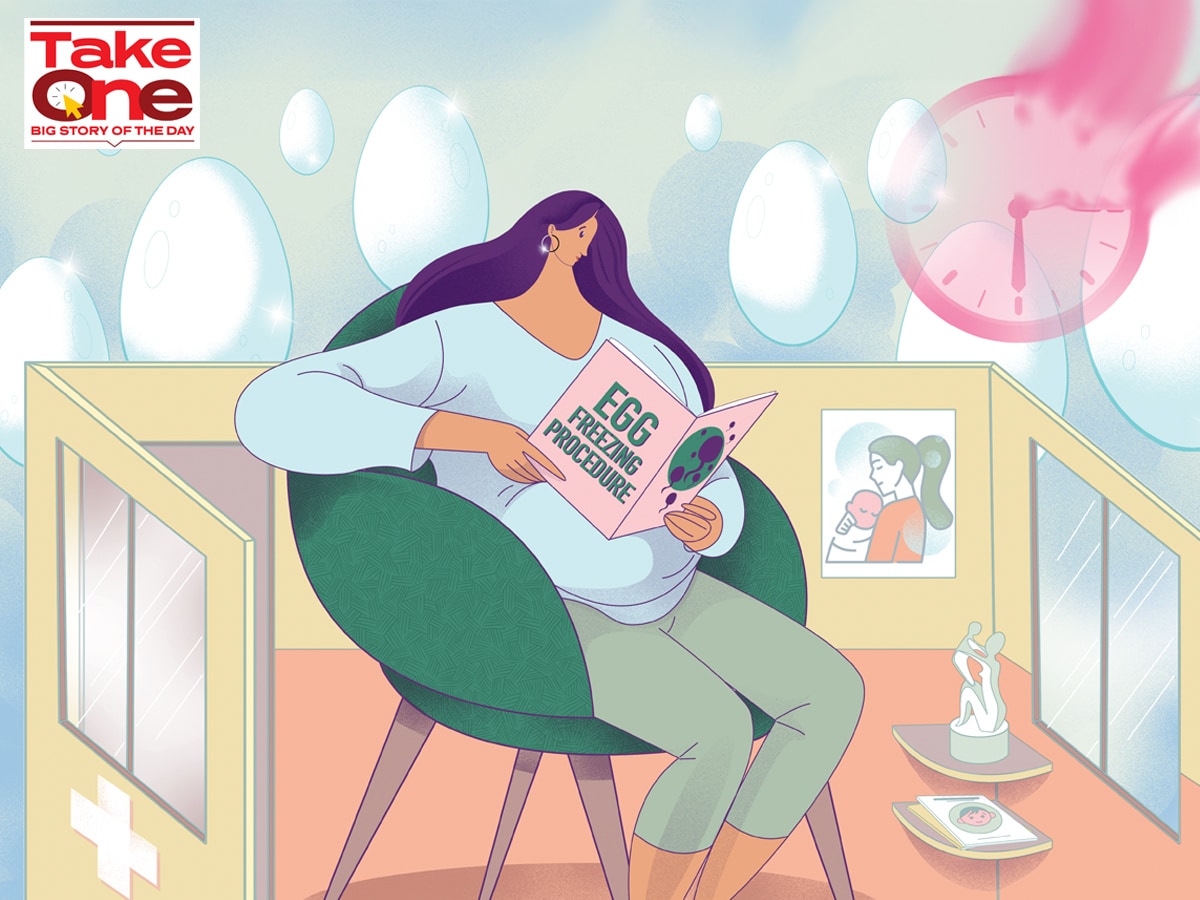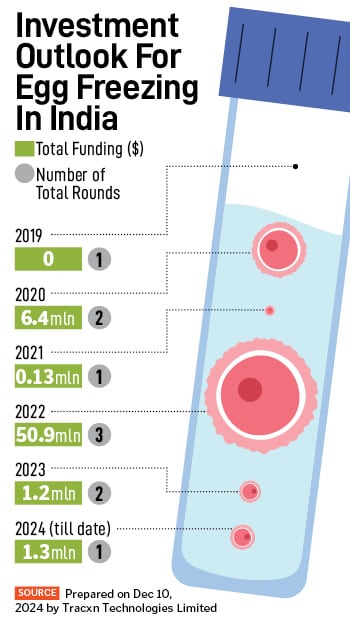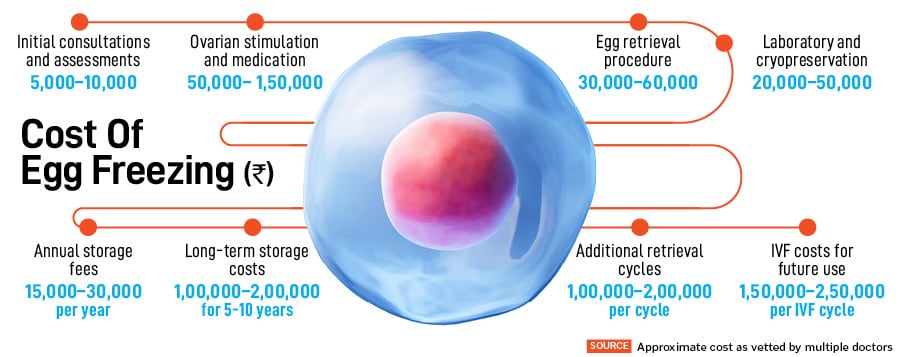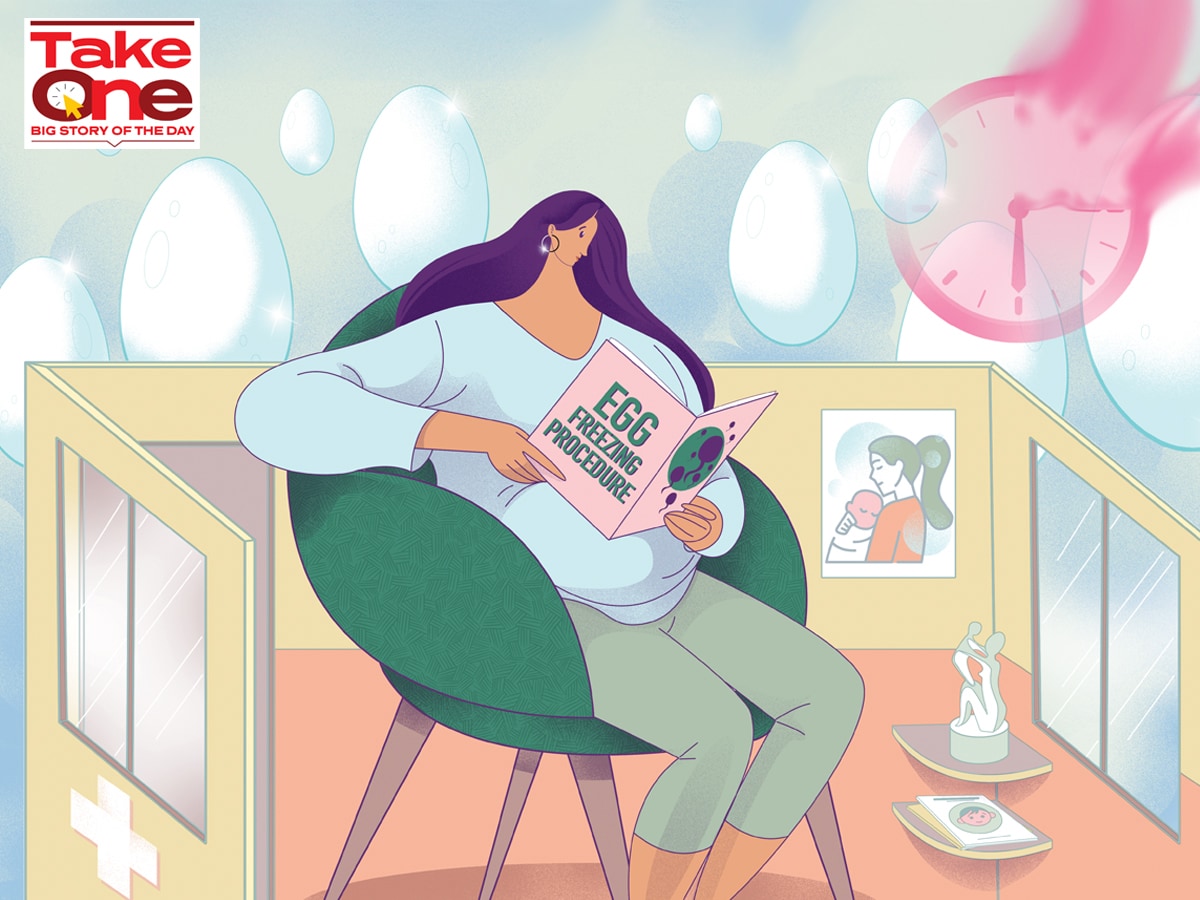 Egg freezing is rapidly spreading in metros.
Egg freezing is rapidly spreading in metros.
Illustration: Chaitanya Dinesh Surpur
At 27, Meera Rajput (name changed), finds herself sitting in a brightly lit clinic in South Mumbai, staring at a slideshow about ovarian reserve. A corporate lawyer with an unrelenting schedule, Rajput leads a rather stressful, time-deficient lifestyle. Sitting alongside three women who are all scanning brochures on fertility kept on the table, she feels a pang of uncertainty as she meets her gynaecologist to learn about the egg-freezing options she could explore.
“I like to be well prepared in life,” she tells Forbes India, after her consultation. “Doctors say that as we age, our egg quality deteriorates. I know my lifestyle doesn’t help my fertility. Stress, an erratic schedule, and my PCOD are all affecting me. I want to keep my younger, healthier eggs as an option for the future,” says Rajput, who plans to freeze her eggs as she doesn’t intend to marry or bear children anytime soon.
Rajput is part of a growing cohort of Indian women exploring egg freezing, or oocyte cryopreservation, not due to medical necessity but as a proactive measure. The concept is becoming increasingly popular in India’s metropolitan hubs, where careers, delayed marriages, and evolving societal norms are reshaping how women approach motherhood.
Women through their 20s and 30s are targeted by ads of fertility clinics offering egg freezing as an option. Most women in their 30s would know someone who has frozen their eggs as a means of biological liberation. While data regarding the practice in India is limited, women in their 30s have opted to freeze their eggs in the last decade. The uptake today, however, is among women in their 20s in tier 1 cities.
 While women in tier 1 cities are increasingly embracing this option, women in tier 2 cities face a very different set of challenges. Take, for example, Suchi Sharma (name changed), 34, a graphic designer from Jalandhar, Punjab, and Riya Kapoor (name changed), 38, a restaurateur in Mumbai, both of whom froze their eggs in 2023. For Sharma, the process was taxing. She had to travel to different cities, consult multiple gynaecologists, lacked family support, and had to keep the entire procedure under wraps. In contrast, Kapoor found it to be a straightforward process, and even encouraged others on social media.
While women in tier 1 cities are increasingly embracing this option, women in tier 2 cities face a very different set of challenges. Take, for example, Suchi Sharma (name changed), 34, a graphic designer from Jalandhar, Punjab, and Riya Kapoor (name changed), 38, a restaurateur in Mumbai, both of whom froze their eggs in 2023. For Sharma, the process was taxing. She had to travel to different cities, consult multiple gynaecologists, lacked family support, and had to keep the entire procedure under wraps. In contrast, Kapoor found it to be a straightforward process, and even encouraged others on social media.
The stigma and hushed conversations around the topic are barriers for a potentially large, yet to be formalised industry. “Fem-tech [female technology] as an industry has exceptional potential beyond what it’s perceived as today,” says Trishila Punjabi, 26, founder of Bharat MD, a fem-tech platform that caters to egg freezing needs of tier 2 and 3 cities in Gujarat. It connects gynaecologists from tier 1 cities to clients in need in tier 2 cities and beyond.
The startup potential
Egg freezing is rapidly spreading in metros. “Until five years ago, I used to get one or two women enquiring about egg freezing in a year. Today, we get five to six women walking in to freeze their eggs every month,” says Dr Surveen Ghumman Sindhu, senior director and head of department of infertility and IVF at Max Multi Speciality Centre in Delhi.
As of December 2024, the total equity funding raised for the egg-freezing market in India is $59.9 million. These include Oasis IVF in Telangana, BabyScience IVF Clinics in Karnataka, and Crysta IVF in Delhi, according to Traxcn, a startup data platform. (See box.)
Asia Pacific is set to experience the fastest growth in the global egg freezing and embryo banking market, with a CAGR of 17.62 percent until 2034, while the global market is projected to reach $25.63 billion by 2034, according to Precedence Research, a market insights platform.

Fertility treatment is largely frowned upon in India. “We’re living in a silent infertility epidemic; people don’t address their fertility needs properly,” says Dipalie Bajaj, co-founder of Arva Health, a fertility testing and diagnosis startup based in Bengaluru, which provides egg-freezing consultations by connecting women to doctors. It offers a range of services that include fertility assessments, education, advanced treatments, and PCOS care.
Competing against IVF clinics, Arva Health claims to be the first startup in the sector. Bajaj and Nidhi Panchmal started Arva Health in May 2022 and has a network of 14 doctors with more than 2,500 clients and has serviced more than 4,000 queries. “We do have the first-mover advantage, the fertility market in India is at a very nascent stage and is set to grow by leaps and bounds,” Bajaj says. While they weren’t keen on sharing their revenue data, they say their business grew 60 percent month-on-month, with 25 percent of revenue coming from egg freezing.
Panchmal highlights the key insights from their research: “We spoke to women from small towns and villages, trying to cover as wide a ground as possible. Two key things we learned are that 95 percent of women stress about their biological clock, and almost every woman has had a bad experience at a gynaecologist’s clinic, which makes them wary of ever interacting with the health care system again.” She adds, “We’ve seen over 40 percent increase in egg-freezing queries over the last 12 months and it’s only going to grow.”
It was Bajaj’s and Panchal’s personal fertility tests that motivated them to start the business. “With the right awareness programmes and corporate tie-ups, when we open centres in Delhi, Bengaluru, and Mumbai, we can be among the first movers focussing on egg freezing. The market potential could lead to significant revenue,” she elaborates, adding that the growth in smaller towns is slower. “Since we’re starting in Ahmedabad, awareness is low, at only about 5 percent. However, the margins are much higher. For every egg-freezing cycle, we charge Rs 2 lakh,” says Punjabi of Bharat MD. The two-year-old startup has tied up with 90 hospitals and has catered to 4,000 patient queries. She believes that while there is a growing curiosity among women in smaller towns, it’ll still take time to translate into action. “There is so much scope to grow,” she says. “It is an untapped market, primarily because of the stigma associated with fertility conversations and the steep costs. But the interest for a security cushion is changing the game.”
Social egg freezing is a rather expensive procedure in India. The cost of a single egg-freezing cycle ranges from Rs 1.5 to 2.5 lakh, with additional yearly storage fees. This limits access to affluent women or those whose employers offer fertility benefits—a rare but growing trend. “The cost is still less than the global markers,” says Sindhu, of Max Multi Speciality Centre in Delhi. “Egg freezing costs a sixth of what it is globally.”
The corporate influence
According to the 2024 Avtar & Seramount Best Companies for Women in India report, 30 percent of the 2024 Best Companies extend support for egg freezing treatment. Also, 41 percent of the 2024 Best Companies provide reimbursement for surrogacy expenses, and 48 percent of the companies extend support for other fertility procedures.
Employee-centric establishments offer such benefits. Spotify, for instance, offers comprehensive family-forming benefits to all full-time employees since 2021. These include in-vitro fertilisation (IVF), egg freezing, fertility preservation, donor services, adoption support, and fertility assessments. “We view these benefits as strategic investments for retaining better talent. With the war for talent being so competitive, this is a massive commercial advantage that has helped our business grow tremendously over the past years. We realise that the cost of us not doing this will be much higher,” says a Spotify spokesperson.
Citibank, TIAA Global Capabilities Private Limited, and L’Oréal have spoken about offering egg-freezing support as part of their infertility treatment benefits. Survey data from workforce consultant Mercer showed that globally the percentage of large employers covering egg-freezing benefits climbed to 15 percent in 2021 from just 5 percent in 2015.
“A company becomes 1,000 times more attractive if they cover fertility benefits,” says Smita Kanodia, 34, a PR professional who froze her eggs last year. “I feel you address fertility issues only once you have successfully addressed the more consequential day-to-day problems, making the work environment so much healthier.”
While large corporates have included such benefits, startups aren’t falling behind. “Going through this process has made me realise that I want to create a workplace where women can openly discuss and consider options like egg freezing without fear of stigma. It is something I plan to prioritise as the company grows,” says Kiara Singh (name changed), founder of a boutique PR agency in Mumbai.
Bizongo, a B2B ecommerce platform, introduced egg-freezing benefits in 2023. “One thing we have realised is that until we introduced this policy and conducted workshops to explain to people what the process is about, many didn’t even know about this. All they had heard was celebrities talking about egg freezing, but didn’t know the practical first-hand implications of it,” says Aarfa Shaikh, associate director of HR at Bizongo.
Roadblocks on a bumpy road
Social oocyte freezing is a sensitive experience bearing a complex psychological and social impact on patients, studies have evaluated the aspect of women’s experiences and the need for adequate counselling regarding benefits, risks, alternative reproductive options, and emotional support throughout the oocyte freezing process.
It starts with 10–14 days of hormone injections, often two or three per day, to stimulate the ovaries to produce a large numbers of eggs at once. Patients then need visit a clinic two or three times a week for ultrasounds and bloodwork. Finally, when the eggs are of the right size, another injection known as a ‘trigger shot’ gets the eggs ready for collection, which is a 10-minute surgery.
“Egg freezing typically involves a standard storage period of 10 years. In an average egg-freezing cycle, approximately 90 percent of frozen eggs survive thawing, 70 percent successfully undergo fertilisation, and around 45 percent of these fertilised eggs lead to a successful pregnancy,” says Dr Shital Punjabi, a gynaecologist in Ahmedabad.
According to the India Society for Assisted Reproduction, the success rates of egg freezing in India are higher for women in their 20s and early 30s than those who go for the procedure later in life.
“The physical process was manageable, but the emotional toll was much harder than expected. It wasn’t just about the injections or the procedure itself; it was the weight of feeling like I had to do this to protect my future,” says Singh. The hormone injections can also have an impact on women’s mental well-being if adequate support isn’t provided. “The injections can be taxing,” says Priya, who is a clinical psychologist in Gurgaon and who also froze her eggs in 2023. “There will be a lot of anxiety around it. We need to understand that the anxious what-ifs are not to be entertained through this process, and family support is very important.”
Interestingly, while egg freezing is considered as a safety-net, most women don’t go back to it. A study published by the US-based National Library for Medicine estimates that globally 16 percent of women returned to use their frozen eggs between January 2016 and March 2023. Of those women, 12 percent were under 35 years of age at the time of egg freeze, 44 percent were between the age group of 35 to 38, and 44 percent women were older than 38 years.
“The cost is prohibitive for many, and the lack of open conversations keeps it out of reach for those who might benefit from it. Until we address these barriers, egg freezing will remain something that only a small percentage of women can consider,” says Singh. “For me, this process was as much about securing my future as it was about challenging the outdated narratives that hold women back.”
As India’s fertility landscape evolves, one thing is clear: The conversation is shifting from reactive to proactive, empowering women like Rajput and Singh to make decisions that align with their aspirations—whether that involves children at 30, 40, or not at all. “Egg freezing,” as Rajput puts it, “is not about delaying motherhood; it’s about keeping the door open.”
